The process of fermenting grain to make beer was likely discovered by several cultures independently as hunter-gatherers settled into agricultural societies around 12,000 years ago, but the first physical evidence of beer brewing dates to 3400 B.C.E. in Mesopotamia.
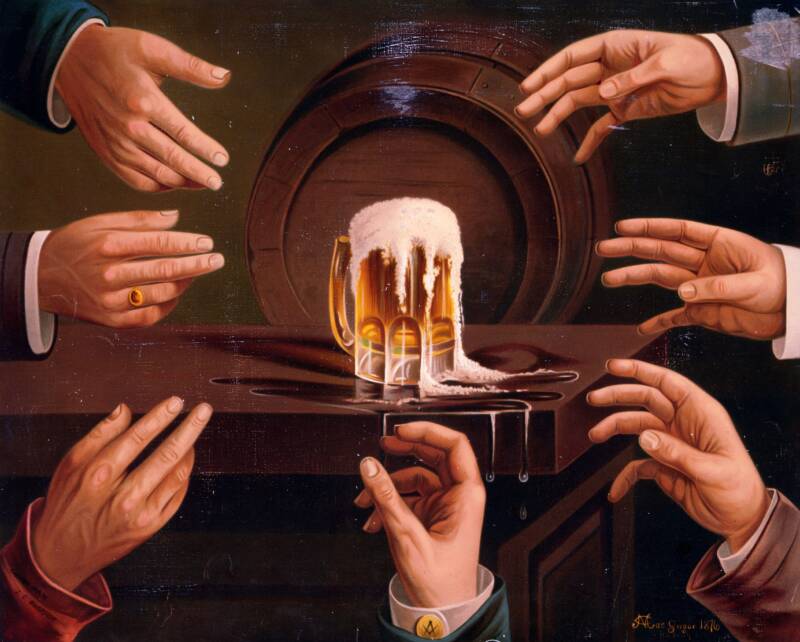
JJs / Alamy Stock PhotoA vintage beer advertisement from 1876.
Beer is one of the most popular alcoholic drinks in the world, and it has been consumed by people across the globe for millennia. But who invented beer?
That question isn’t as simple as it may seem. Hunter-gatherers who were beginning to settle into agrarian societies around 12,000 years ago likely discovered alcohol independently as food they stored fermented. Evidence of a mead-like beverage made of water, rice, honey, and fruit was discovered in Jiahu, China, that dated back to 7000 B.C.E. The first known instance of grain fermentation came much later — and across the Asian continent.
Archaeologists in western Iran once found ceramic vessels from 3400 B.C.E. that still contained sticky residue. When scientists analyzed the substance, they discovered it came from barley. Because of the age and location of the vessels, it seems that the Sumerians of ancient Mesopotamia were the first to brew beer.
Still, the question of who invented beer extends beyond a single time or place. The beverage crafted by the Sumerians wouldn’t have been recognizable as beer to modern drinkers. Today’s lagers and IPAs were born from thousands of years of trial, error, and cheers to good fortune.
Why Humans Started Drinking Beer — And Haven’t Stopped
Human civilizations have always been fascinated with mind-altering substances, alcohol included. While certain hallucinogenics often served ritual purposes in ancient times, however, alcohol was initially consumed for more utilitarian reasons.
Author Edward Slingerland addresses this in his book Drunk: How We Sipped, Danced, and Stumbled Our Way to Civilization, writing, “For much of human history, especially after the advent of agriculture and dense urban living, local water sources have often been extremely unsafe for drinking. It is possible that alcoholic fermentation therefore played a role in converting contaminated water into potable liquids.”
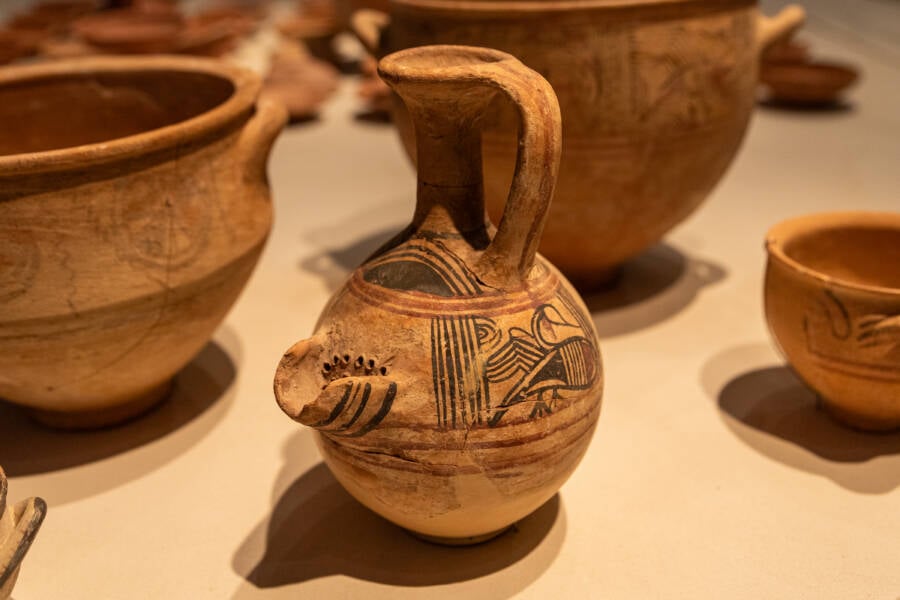
Wikimedia CommonsA Philistine beer jug from the Iron Age.
Researchers Luis Raihofer, Martin Zarnow, Martina Gastl, and Mathias Hutzler echoed the same sentiment in their paper “A Short History of Beer Brewing”, published in EMBO Reports in 2022, which explores the evidence surrounding who invented beer. They wrote:
“For most of the time, intoxication was not the main purpose and could only be achieved to a limited extent, if at all, given that beer had a low alcohol content for most of human history. Instead, beer… was often the only safe liquid to drink when clean water was rare.”
It’s no secret that the human diet, particularly among peasant populations, was lacking in centuries gone by. The poor often lived mainly on bread, porridge, or other foods that had fairly low nutritional value. As such, they needed to supplement their diets.
Fermented foods, including beer, provided some of these essential vitamins, such as vitamin B or riboflavin. Beer and other alcohol also provided extra calories — seven calories per pure gram of alcohol, to be precise. While this may be upsetting for those of us who work desk jobs and are looking to cut calories today, this would have actually been a benefit in ancient times.
It’s why Guinness, for example, boasts the tagline: “a meal in every glass.”
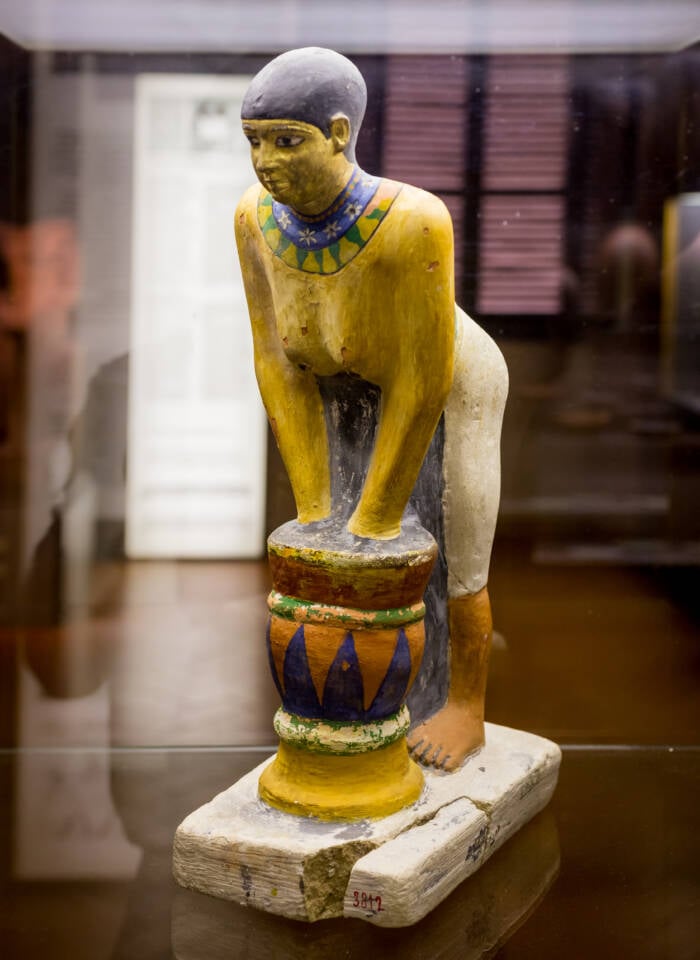
Wikimedia CommonsA model from Egypt’s Old Kingdom depicting a woman making beer.
Factor in that alcohol also has anti-microbial and anti-parasitic properties, and it’s easy to see why it became such a staple of the human diet. As Slingerland put it, “It’s not a bad idea to drink when you have sushi: Washing down the raw fish with sake might help kill any nasty bugs that came along for the ride.”
Different cultures each developed their own form of alcohol — the Irish created whiskey, the Scots made scotch, the Greeks and Romans made wine, and the ancient Chinese and Japanese fermented rice into sake — but beer was surprisingly ubiquitous.
Still, someone, or a group of someones, had to be the first. So, who invented beer?
The Millennia-Old Question Of Who Invented Beer
Even with modern advancements in technology, trying to discern when, where, and how humans first discovered beer has proven difficult. In part, this is because we discovered fermentation so long ago. Some researchers have found evidence of beer brewing as far back as the Neolithic period (10,000 to 4,000 years ago).
Penn State assistant professor of anthropology Kirk French told Live Science that some of the earliest evidence of alcohol brewing comes from 9,000-year-old sites in China, where archaeologists discovered plant, yeast, and mold residue on ancient pots that could suggest they once contained a fermented beverage.
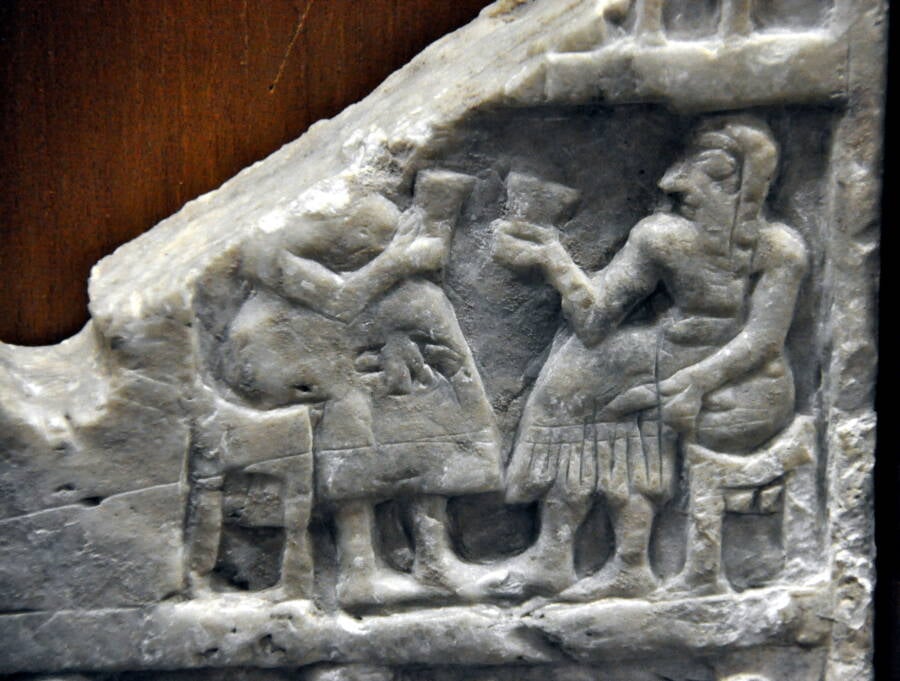
Wikimedia CommonsA depiction of beer on the Sumerian “Banquet Plaques.”
One site in particular, Jiahu, held drinking vessels that showed signs of fermented rice, honey, and fruit. The evidence strongly suggests that something was indeed brewed there, but it was seemingly more of a mead than a beer.
There are older sites that also contain similar evidence of fermentation. One in Turkey, Göbekli Tepe, dates back 11,000 years and features large stone kilns that were used to grind grain. Though some researchers have theorized this grain may have been for bread, others suggest the coarseness of the grind may indicate that the grain was used for fermentation.
There is also a site near Haifa, Israel, that dates back 13,000 years and also shows signs of possible grain fermentation. However, the first known evidence of barley being fermented into an alcoholic beverage comes from the Sumerians of Mesopotamia, suggesting they may have been the people who invented beer.
Around 5,000 years ago, references to beer also started appearing in written works. Texts from ancient Mesopotamia feature accounts of brewing, and Sumerian art depicted people drinking beer. In fact, Sumerian myth even links the origins of humanity to a combination of drinking beer and good sex.
The Epic of Gilgamesh, one of the oldest surviving literary documents in the world, mentions that the “wild man” Enkidu “ate until he was full, drank seven pitchers of beer, his heart grew light, his face glowed and he sang out with joy.” After this, a temple prostitute and Enkidu had sex for a week.
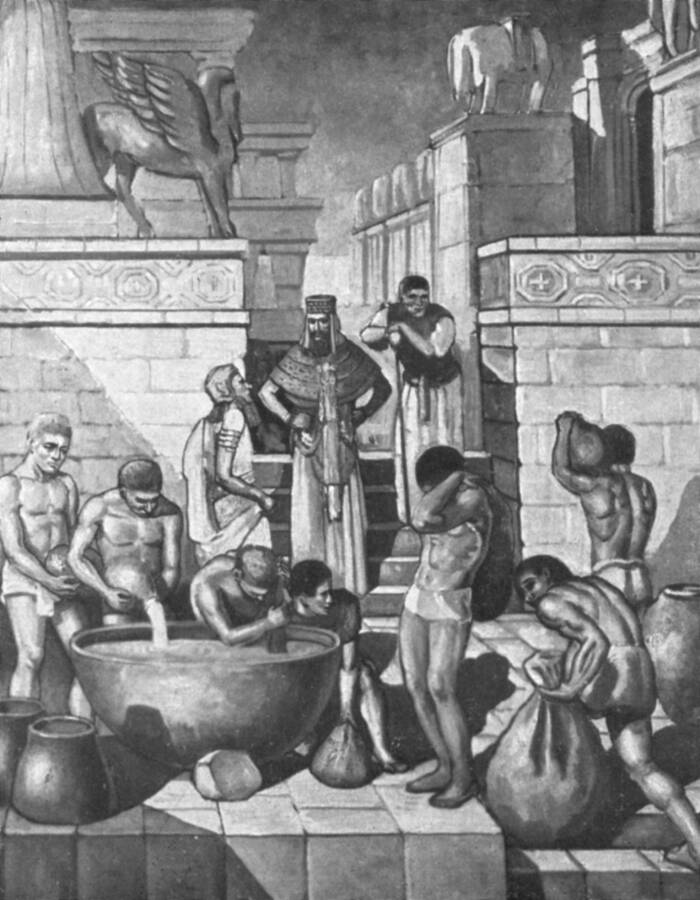
Science History Images / Alamy Stock PhotoAn illustration of Babylonian beer making.
Meanwhile, the Ebla tablets, found in Syria in 1974, offered proof that beer was being produced in the city back in 2500 B.C.E. Evidence of beer brewing has also been found in ancient Babylonia.
Notably, many of these texts emphasize that women were in charge of the brewing process.
Even as recently as February 2021, researchers discovered what is now believed to be the world’s oldest known brewery at an ancient Egyptian burial site. And in July 2024, archaeologists unearthed the only known Roman-era brewery in Italy.
All that said, it’s nearly impossible to definitively say exactly who invented beer. Over time, however, techniques for creating more flavorful, stronger, and varied beers began to emerge.
The Evolution Of Beer From Ancient Times To Today
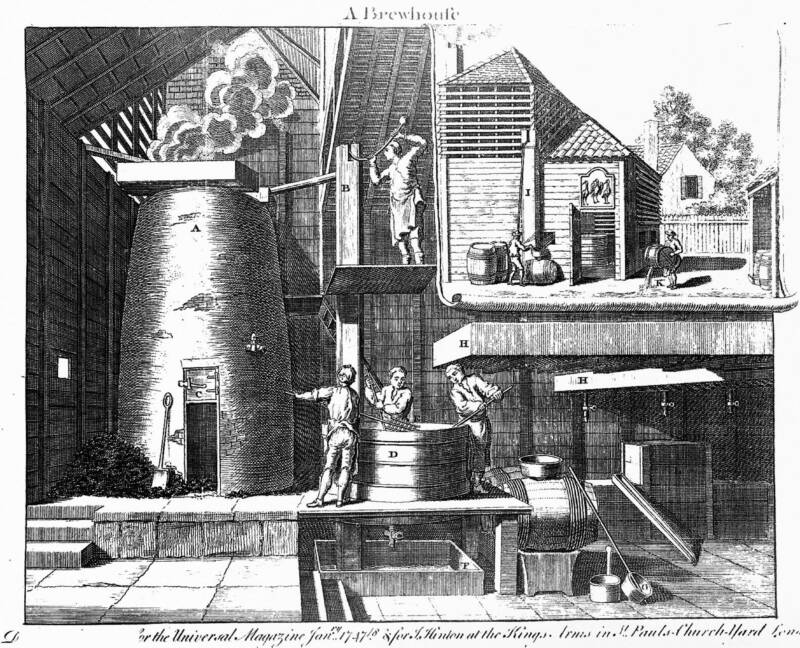
Lakeview Images / Alamy Stock PhotoThe interior and exterior of a working brewhouse, circa 1747.
Beer began to spread across the Middle East around 5,000 years ago. Pharaohs in Egypt likewise incorporated the alcoholic beverage as a part of their daily diets around the same time, and by the time of Sophocles and Polybius in Greece, beer was seen as an integral part of life.
And as societies progressed, so, too, did beer. By the Middle Ages, beer was one of the most commonly consumed beverages by the wealthy and poor alike.
Elsewhere, scholars and historians were writing about the more harmful effects of beer. Aldebrandin of Siena, for example, wrote in 1256 that beer “harms the head and the stomach, it causes bad breath and ruins the teeth, it fills the stomach with bad fumes, and as a result anyone who drinks it along with wine becomes drunk quickly; but it does have the property of facilitating urination and makes one’s flesh white and smooth.”
Then, around the ninth century C.E., brewers began to experiment with new ingredients for beer. These brewers were probably the people who invented beer as we know it today. Around this time, hops were introduced to the process, and the English began to draw a very clear, uncrossable line between English ale and beer.
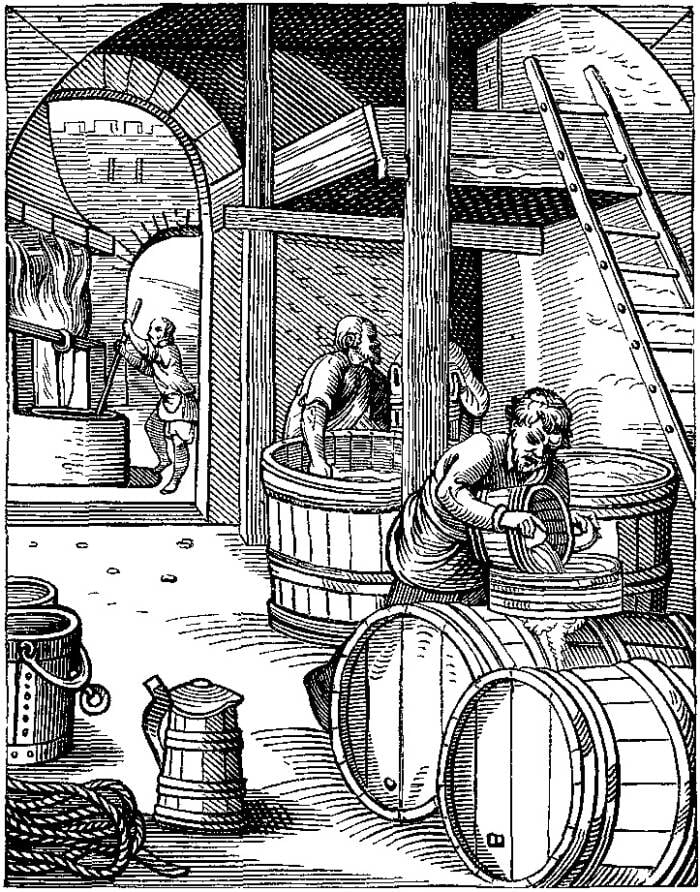
Public DomainAn engraving of a 16th-century brewery.
Some were highly opposed to hopped beer, in fact, believing that hopped beer was unnatural as opposed to the supposedly purer ale. Hopped beer was believed to cause bloating and weight gain, while the misconception that pure, non-hopped ale carried more health benefits. At this time, though, beer brewing was not yet an industry but rather a family activity.
It wasn’t until the 14th and 15th centuries that the brewing scene ballooned into a large-scale export industry, and more modern styles of beer began to emerge.
Even today, with the health benefits of beer largely dismissed and the very real health risks made more apparent than ever before, the beer industry is thriving. According to the Brewers Association, in 2024 alone, despite seeing an overall decrease of about 3.9 percent in production from 2023, the craft brewing industry produced 23.1 million barrels of beer.
That equated to around $28.8 billion in profits — a three percent increase over 2023. And that’s just in America.
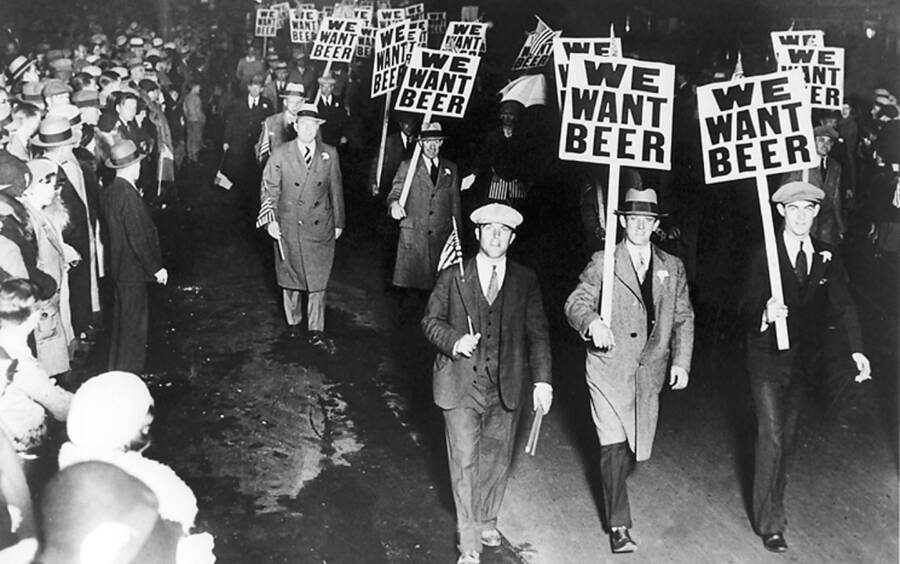
Public DomainAnti-Prohibition protestors holding signs that read “WE WANT BEER.”
Clearly, beer isn’t going anywhere anytime soon. It is so beloved, in fact, that even those who choose to give up drinking are finding ways to consume beer as non-alcoholic beers flood the market. Many, including Slingerland, have made the argument that beer and alcohol, for all their faults, may very well have made human society into what it is.
So, despite the murky origins of who invented beer, it’s fair to say that it is one of the most important inventions in human history. We may not know who to thank for bringing it into the world, but we should certainly raise a glass to them.
After this fascinating look into who invented beer, why not learn all about the inventions of pizza and ice cream?





